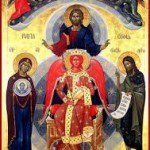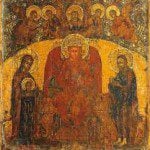Big Bowl, Fish Bowl, Crystal Bowl, I rarely pay attention to sports.
Many years ago when the Red Sox played in the World Series, I was going down the hall listening to an opera on my Walkman. A law school professor stopped me wearing a Red Sox cap to ask about the score, thinking I had the radio on. “Carmen,” I told him. He looked puzzled.
My ears did perk up a few years ago about a major sporting even when the great Renée Fleming sang the national anthem. The sports thing was historic since no opera singer had ever appeared at such a venue, whatever it was.
My eye brows wrinkled when I read the Public Religion Research Institute (PRRI) had released a survey just before  the Super Bowl which found twenty-five percent of “Americans say God plays a role in determining which team wins a sporting event, but close to half (49 percent) agree that God rewards athletes who have faith with good health and success.”
the Super Bowl which found twenty-five percent of “Americans say God plays a role in determining which team wins a sporting event, but close to half (49 percent) agree that God rewards athletes who have faith with good health and success.”
The PRRI survey further found that white evangelical Protestants “are more likely than the public to answer affirmatively on both accounts: More than one-third (36 percent) agree God helps determine a game’s outcome, and more than six in ten (62 percent) agree God rewards devout athletes.”
“Does God also determine who will be the next great Brunnhilde to sing in Wagner’s Ring,” I wondered? How many prayers does it take to win the lottery? How many more will it take to end injustice?
This raises interesting questions about the purpose and nature of prayer. I often observe the homeless seeking solace in churches. My silent prayers for them often ask God to send some amount of joy in their difficult day. I don’t ask for the homeless to have an apartment without financial worries. Maybe I should.
Many living on the streets are quick to offer you a blessing when you provide money to them or just stop to have a brief conversation and acknowledge their humanity. In one case, I remember a homeless woman with a cat during mid-autumn thanking me for the cash I gave her and asking, “Will you have enough for yourself?” I was wearing a suit and holding a brief case. She blessed me as I left.
Often friends or acquaintances will ask me to offer prayers because of a death, divorce, sick child, personal crisis, possible job loss, or just because they’re feeling overwhelmed and need a blessing. Sometimes I’ll make my way into a church to light a candle and offer a prayer hoping whatever request I’ve made will be lifted to the heavens and someone will be blessed, comforted, or find resolution.
You often hear the phrase, “the power of prayer.” If I’m honest, I sometimes think that though prayer may force me to reflect and be more grounded, does it help anyone else? Is a higher power actually hearing my offer of thanks or request for some type of intervention on my behalf or for someone else?
“Even if many days and years pass,” Rabbi Nachman of Bratslav teaches, “and it seems that you have accomplished nothing with your words, do not abandon the practice. Every word makes an impression.” He reminds us of how water wears away a stone drip by drip.
Dante said “hell is endless conversation with one’s self.” At some point you need to shut off the mind from the endless questions and spiritual struggles that can arise in seeking to experience God. Stillness becomes critical.
One of several works that had a profound impact on my outlook and theology is Elie Wiesel’s The Trial of God. Although the setting is in Eastern Europe during the start of a pogrom, the play is based on an experience Wiesel had in a death camp as a child.
He watched men of faith put God on trial for crimes against the Jewish people. The Creator is tried in absentia in Auschwitz over several nights. At the end the Holy Author was convicted. Before attempting to get some sleep they ended their night by offering prayers to The Giver of Life and the next day they were murdered in gas chambers.
I offer prayers to God and the co-Creator, Holy Sophia the Holy Spirit, in part, to have wisdom, for patience, and to express gratefulness, while trying to learn humility and seek an allusive experience with holiness. In addition, if you  have crossed my path regardless for how long, whether in a positive or negative way, and especially if you remain directly in my life, you’re remembered in my prayers.
have crossed my path regardless for how long, whether in a positive or negative way, and especially if you remain directly in my life, you’re remembered in my prayers.
The possibility of hell doesn’t frighten me, perhaps it should. I have no expectation of a heavenly afterlife, but I pray, not for some eternal reward, but because it seems the right thing to do. Touchdown!
_________________________________________
Paul P. Jesep is an attorney, corporate chaplain, and former US Government Relations Director for His Beatitude Metropolitan Myfody of the Ukrainian Autocephalous Orthodox Church of Kyiv and All Rus-Ukraine. He is author of “Lost Sense of Self & the Ethics Crisis” and “Crucifying Jesus and Secularizing America – the Nation of Faith without Wisdom.”














